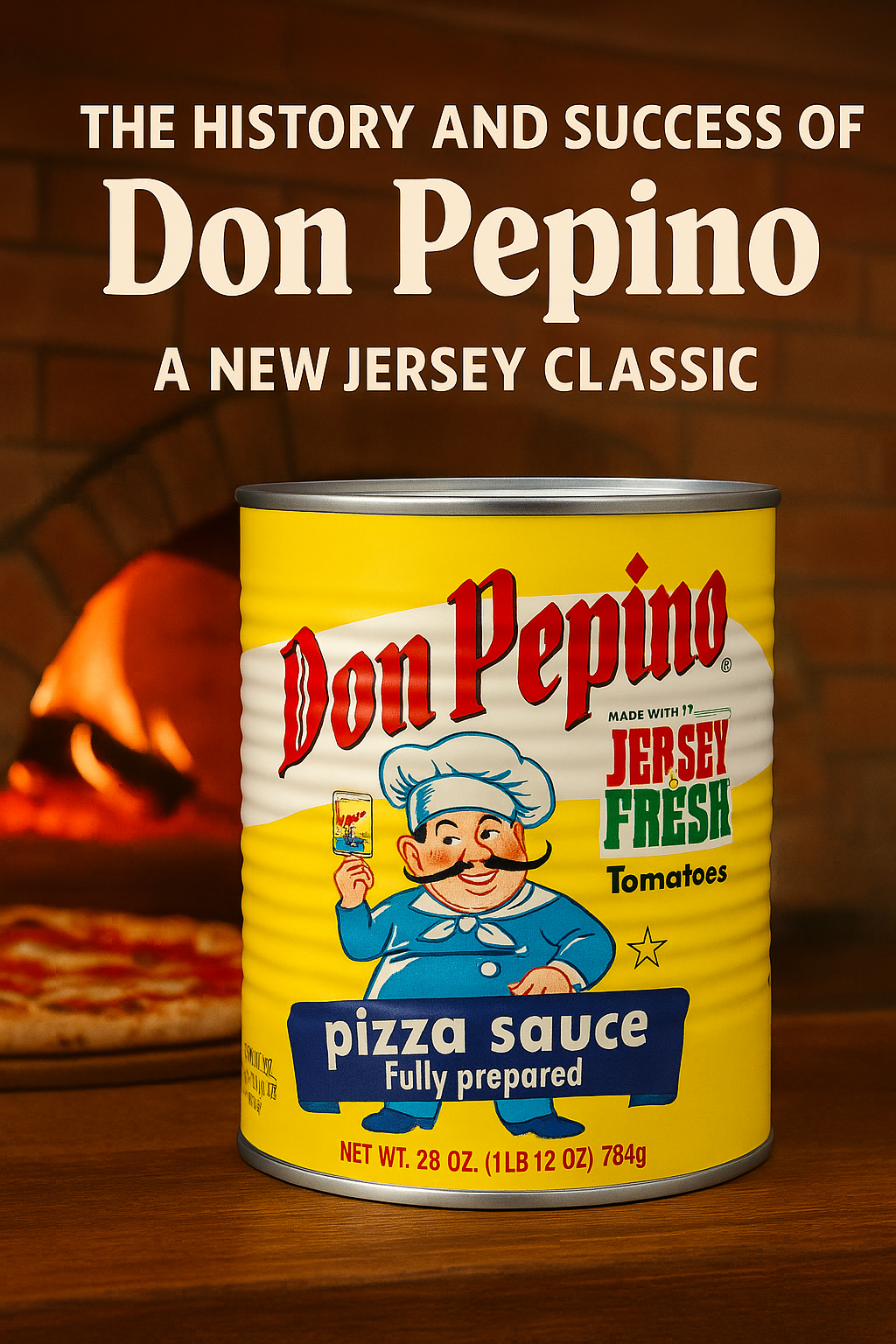
In the competitive world of Italian-American food products, few brands have maintained both authenticity and market relevance like Don Pepino. This iconic sauce, born from New Jersey’s rich agricultural traditions, represents the perfect marriage of immigrant ingenuity and Garden State bounty. With its distinctive red and white label featuring a portly, mustached chef, Don Pepino has transcended generations to become a pantry staple across the Northeast and beyond.
The Sclafani Family Legacy
The story begins with the Sclafani family, who immigrated to America from Italy in the late 1800s. Bringing their culinary traditions and entrepreneurial spirit, Marie Sclafani and her husband established a food business focused on Italian specialties. By the mid-20th century, their enterprise had evolved into a significant canned tomato producer.
The watershed moment came in 1950 when Dominick Sclafani created what would become Don Pepino pizza sauce—America’s first fully prepared pizza sauce. At a time when home cooks and pizzerias had to season their own sauces, Dominick’s innovation offered convenience without compromising on authentic Italian flavor.
“We wanted to create something that tasted like it came from Nonna’s kitchen, but without requiring hours of simmering and seasoning,” noted the Sclafani family in early promotional materials. “A sauce that was ready to use but never tasted mass-produced.”

The New Jersey Tomato Connection
The secret to Don Pepino’s enduring quality lies quite literally in the soil of New Jersey. The Garden State’s unique combination of climate, rainfall patterns, and soil composition creates ideal conditions for growing flavorful tomatoes with the perfect balance of sweetness and acidity.
New Jersey tomatoes, particularly those grown in the southern counties, develop distinctive characteristics that make them prized by chefs and food manufacturers:
- Higher lycopene content than tomatoes from many other regions
- Balanced sugar-to-acid ratio for a natural umami flavor
- Firm flesh that maintains texture during processing
- Rich red color that translates to vibrant sauce
Don Pepino proudly carries the “Jersey Fresh” certification, confirming the brand’s commitment to sourcing locally grown produce. The tomatoes are harvested at peak ripeness, typically between July and September, and quickly transported to the Williamstown processing facility to preserve freshness.
The Recipe: Simplicity as Virtue
Perhaps the most remarkable aspect of Don Pepino’s success is its unwavering commitment to recipe integrity. For over 70 years, the formula has remained virtually unchanged:
- Fresh New Jersey tomatoes
- Corn oil (rather than olive oil, a distinctive choice)
- Salt
- Spices
- Garlic powder
Notably absent are preservatives, artificial colors, added sugars, citric acid, and other additives common in commercial sauces. This simplicity has become a selling point in an era of clean labels and ingredient transparency.
“When you look at our ingredient list versus competitors, it’s half as long,” says a company representative. “We don’t need all those extras because we start with exceptional tomatoes.”

Business Evolution and Market Position
Don Pepino’s journey through corporate ownership reflects the broader consolidation of American food brands. The sauce remained family-operated until B&G Foods acquired the brand through its purchase of Violet Packing LLC in 2010. This transition brought broader distribution while maintaining production at the original Williamstown facility.
In a significant development, May 2025 saw B&G Foods sell Don Pepino to Violet Foods, a portfolio company of Amphora Equity Partners. According to industry analysts, this strategic divestiture allows B&G to focus on core brands while reducing debt, while positioning Don Pepino under ownership that specializes in heritage food brands.
The sauce competes in the expanding pizza sauce market, projected to reach $11.14 billion by 2033. Despite multinational competition, Don Pepino maintains strong regional loyalty, particularly in the Northeast, where its connection to New Jersey agriculture resonates with consumers.
Restaurant consultant Maria DiNapoli notes, “Don Pepino has maintained relevance by understanding that authenticity isn’t just about tradition—it’s about transparency. Today’s consumers want clean ingredients and a genuine story, which this brand delivers.”

Cultural Impact and Lessons for Food Entrepreneurs
For food and beverage professionals, Don Pepino offers several valuable lessons:
- Geographic Authenticity Matters: The brand’s connection to New Jersey agriculture provides a compelling narrative that generic “Italian-style” products can’t match. Regional sourcing creates both quality differentiation and marketing advantages.
- Recipe Consistency Builds Trust: While many brands constantly reformulate to cut costs, Don Pepino’s unchanged recipe since 1950 demonstrates how consistency can build multi-generational loyalty.
- Simplicity as Premium Positioning: In an industry where complexity often masks cost-cutting, Don Pepino’s minimalist ingredient list has become a competitive advantage, particularly as consumer preferences shift toward clean labels.
- Balance Tradition with Accessibility: Don Pepino successfully balances authentic Italian-American flavor with mainstream accessibility—a sweet spot for ethnic food products in the American market.
- Packaging as Brand Heritage: The brand’s vintage-inspired packaging serves as both nostalgia trigger and authenticity signal, demonstrating how visual consistency can maintain brand recognition through decades.
The Future of Regional Food Brands
As Violet Foods charts Don Pepino’s future course, the brand faces both opportunities and challenges. Expanding beyond its Northeast stronghold requires careful marketing to maintain authenticity while reaching new consumers. Meanwhile, climate change impacts on New Jersey agriculture could affect the tomato supply that defines the product.
Nevertheless, Don Pepino’s enduring success shows how regional food specialties can thrive in an increasingly globalized market. By maintaining close ties to New Jersey’s agricultural heritage while delivering consistent quality, this sauce demonstrates that “local” and “scalable” aren’t mutually exclusive concepts.
For food and beverage professionals looking to develop heritage brands, Don Pepino offers a master class in balancing tradition with business adaptability—proving that sometimes, the most innovative strategy is simply to maintain what already works.
Written by Michael Politz, Author of Guide to Restaurant Success: The Proven Process for Starting Any Restaurant Business From Scratch to Success (ISBN: 978-1-119-66896-1), Founder of Food & Beverage Magazine, the leading online magazine and resource in the industry. Designer of the Bluetooth logo and recognized in Entrepreneur Magazine’s “Top 40 Under 40” for founding American Wholesale Floral. Politz is also the founder of the Proof Awards and the CPG Awards and a partner in numerous consumer brands across the food and beverage sector.








